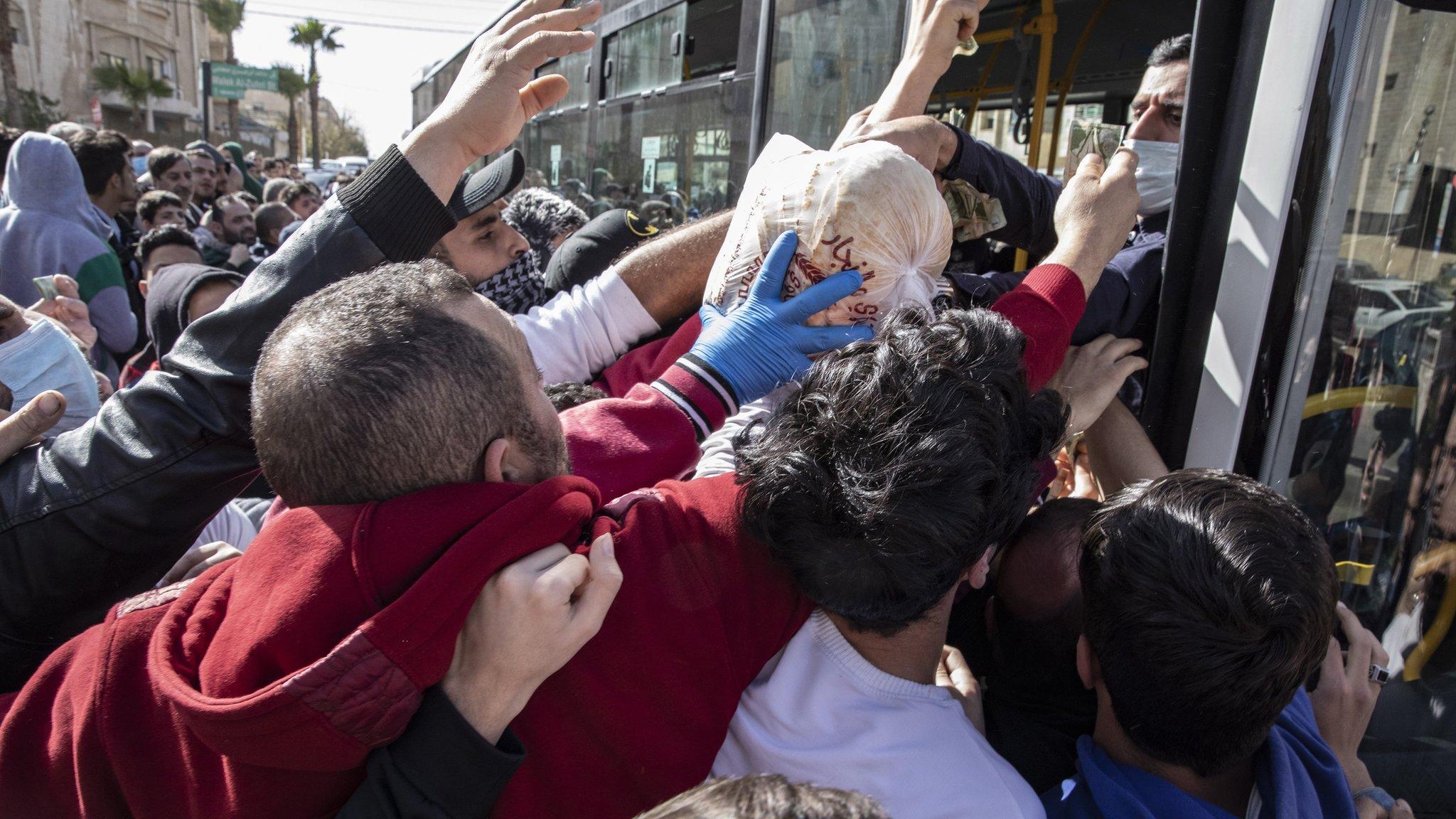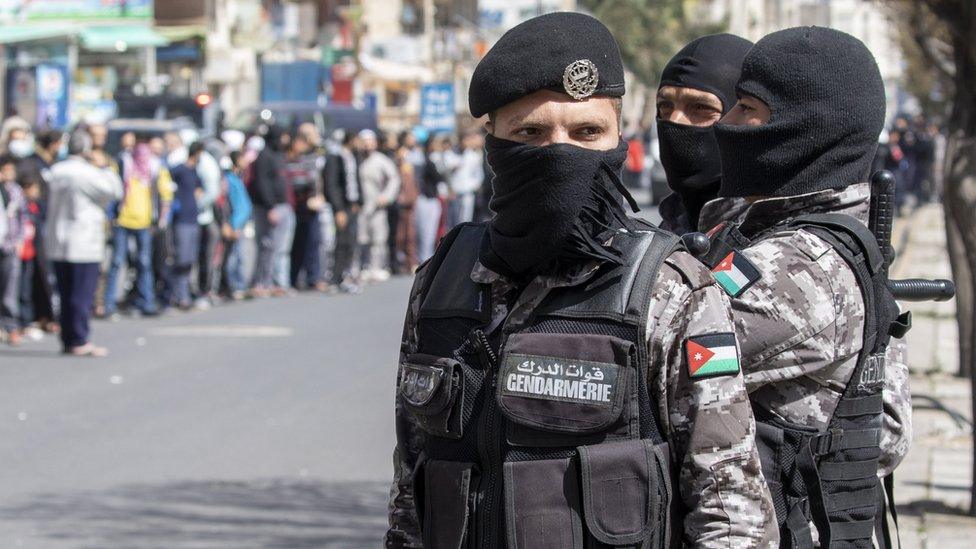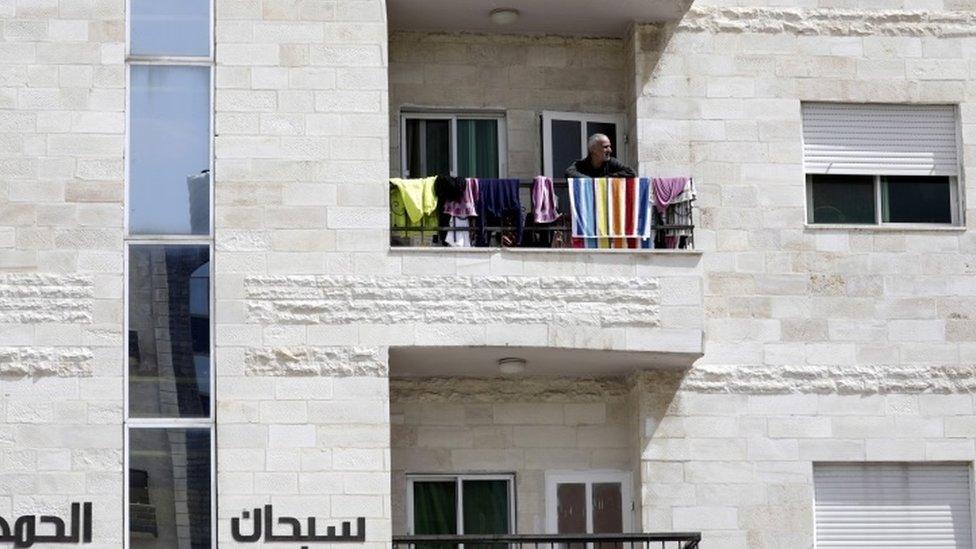Coronavirus: Jordan eases indefinite curfew and allows shops to open
- Published

People crowded around buses distributing bread in some areas of Amman on Tuesday
Jordan has eased an indefinite, round-the-clock curfew imposed to try to limit the spread of the coronavirus.
Ministers had said people would not be permitted to leave their homes at all and that municipalities would deliver supplies of bread and water.
But Prime Minister Omar Razzaz has said that they will now be allowed out on foot to go to small local grocery shops, bakeries and pharmacies.
The country has so far reported 153 cases of Covid-19 but no deaths.
The government imposed the curfew on Saturday, initially for three days, saying too many people had been flouting calls to stay at home.
When the restrictions became open-ended on Monday King Abdullah II expressed confidence in Jordanians' ability to rise to the challenge of fighting the pandemic.
"My brothers and sisters, my family, my people, and my source of fortitude each and every one of you is a soldier of this nation, each in your own post," he said.
Before the curfew began the government warned people that violations would be punishable by up to one year in prison.
Ministers said bread and water would be distributed to households by municipal vehicles, buses and delivery companies each day. Gradually, other basic commodities would be available, they added.

Security forces were deployed on the streets to ensure the curfew was not violated
On Tuesday, Jordanians shared videos of buses being mobbed in some neighbourhoods, external of the capital, Amman, while in others locals were seen queuing in a safe, orderly fashion.
"It's trial and error at a very critical time," said Lubna Wardeh, a resident of the capital Amman, as she waited for a bus with supplies to arrive on her street so she could buy bread and water.
"Those people who went crazy put our quarantine back at zero."
A security official told the AFP news agency that since Saturday more than 1,600 people had been arrested for violating the curfew and taken to quarantine centres.

A SIMPLE GUIDE: What are the symptoms?
AVOIDING CONTACT: Should I self-isolate?
LOOK-UP TOOL: Check cases in your area
MAPS AND CHARTS: Visual guide to the outbreak

On Tuesday evening, the prime minister said the restrictions were being eased and that people aged between 16 and 60 would be permitted to leave their homes between 10:00 and 18:00 to walk to shops to buy supplies.
Large supermarkets will be able to sell goods online for delivery from Thursday.
"I understand the worry and anxiety," Mr Razzaz said "The curfew is not a natural state that we have ever experienced before and reflects negatively and psychologically on us."
But Mr Razzaz stressed the need for social distancing, and warned that any overcrowding, shoving or pushing would lead to an immediate closure of shops.
"Either there is discipline or we will close shops where we see congestion," he said.

King Abdullah said he was confident Jordanians would rise to the challenge of fighting Covid-19
Last week, King Abdullah issued a decree granting the government sweeping powers to curtail basic rights.
Mr Razzaz pledged at the time to carry it out to the "narrowest extent" and not to impinge political rights, freedom of expression or private property.
The government had already closed Jordan's land and air borders, converted more than 30 hotels into quarantine centres for people arriving from abroad, and closed public and private businesses and offices.